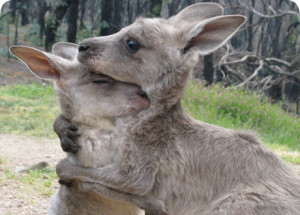Volksgesundheitsrisiko Kängurufleisch hoch
Thieme: Stop Import Kängurufleisch
Marianne Thieme will Kängurufleisch nicht länger in den Niederlanden und Europa zulassen. Die Produktion von Kängurufleisch in Australien ist mit ernsthafter Tierquälerei verbunden, wie zum Beispiel das Totschlagen von Jungtieren oder schwerverletzte Kängurus dem Tod überlassen. Außerdem birgt Kängurufleisch große Risiken für die Volksgesundheit. Darum fordert die PvdD mittels Parlamentsfragen ein Importverbot.

Mit der Gewinnung von Kängurufleisch wird ernsthaft gegen das Wohlbefinden der Tiere verstoßen. Jungtieren werden totgeknüppelt, da die australische Regierung dies als die humanste Tötungsart ansieht. Elterntiere werden geschossen, die zurückbleibenden Jungtiere verhungern oder fallen Raubtieren zum Opfer. Lediglich Kängurufleisch von Tieren die durch einen Kopfschuss getötet worden sind, darf verkauft werden. Tiere, die an anderen Stellen als dem Kopf getroffen werden, werden für einen langsamen, qualvollen Tod zurückgelassen.
E-coli und Salmonellen
Neben den ernsthaften Verstößen gegen das Wohlbefinden der Tiere, birgt Kängurufleisch hohe Risiken für die Volksgesundheit. Aus mehreren Studien hat sich ergeben, dass Kängurufleisch hohe Konzentrationen an E-Coli (Darmbakterie), Salmonellen und Toxoplasmose aufweist.
Die australische Kängurufleischindustrie, so ergibt sich aus einer Untersuchung der australischen Lebensmittelüberwachungsbehörde, kümmert sich nicht einmal um die banalsten Hygienevorschriften. Kadaver werden an rostige Haken gehängt, tote und lebende Tiere verbleiben in den gleichen Räumlichkeiten, Reinigungs- und Hygienevorschriften werden missachtet und es besteht ein erhöhtes Risiko von Kreuzkontamination.
Importverbot Kalifornien und Russland
Während andere Länder wie Russland und der amerikanische Staat Kalifornien bereits ein Importverbot eingeführt haben, importieren die Niederlande etwa 800.000 t an Känguruprodukten. Das bedeutet einen Anstieg von 400% seit 2007 und umfasst ca. 17% der australischen Gesamtproduktion. Damit sind die Niederlande eine der weltweit wichtigsten Abnehmer von Kängurufleisch.
PvdD-Fraktionsvorsitzende Marianne Thieme fordert deshalb ein Importverbot von Känguruprodukten. Thieme: “Das Totknüppeln von Seehunden hat zu einem Importverbot von Seehundpelz geführt. Da Kängurus werden auf die gleiche Weise getötet werden, müssen Niederland und Europa auch hier Nein zu Kängurufleisch sagen. Außerdem ist erwiesen, dass der Verzehr von Kängurufleisch große Gesundheitsrisiken durch gefährliche Bakterien mit sich bringt.”
Die PvdD arbeitet mit der Animal Justice Party in Australien zusammen.
Thieme: ban the import of kangaroo meat
Marianne Thieme wants kangaroo products to be banned from the Netherlands and Europe. The production of kangaroo meat in Australia goes with serious violation of animal welfare, like clubbing young animals to death and leaving heavily injured animals for dead. In addition, the meat imposes serious health risks. That is why the Party for the Animals has asked for an import ban in parliamentary questions.

The killing of kangaroos for meat goes with severe welfare problems. Young kangaroos are being clubbed to death, since the Australian government considers this to be the most humane method. Parent animals are being shot, leaving young kangaroos to fall prey to predators or to die of starvation. Also kangaroos are being left heavily injured when being shot elsewhere then in the head. The meat can only be sold when a kangaroo is killed by a head shot.
E-coli and Salmonella
Next to the serious violation of animal welfare, the kangaroo meat also imposes a huge threat on public health. Several studies show that the meat can be infected with relatively high numbers of E-coli, Salmonella and Toxoplasma gondii.
The Australian kangaroo meat industry flouts the most basic hygiene rules, as research of the Food Standards Australia New Zealand shows. Carcasses are being hung on rusty hooks, living and dead animals reside in the same spaces, there’s a lack of water and hygiene and an increased risk of cross-contamination.
Import ban California and Russia
While countries like Russia and the state of California have already applied an import ban, the Netherlands are still importing nearly 800,000 tons of kangaroo products. This is an increase of 400% since 2007 and concerns about 17% of the total Australian production. The Netherlands are among the world’s main importers of kangaroo meat.
Marianne Thieme, the leader of the Party for the Animals in the Netherlands, pleads in parliamentary questins to ban the import of kangaroo products. Thieme: “The clubbing to death of seals has already led to in import ban for seal fur.
Now that we see the same horrific methods with kangaroos, the Netherlands and Europe need to say no to kangaroo meat. Furthermore it has been established that eating kangaroo meat comes with big health threats like dangerous bacteria.”
The Party for the Animals cooperates with the Animal Justice Party in Australia.